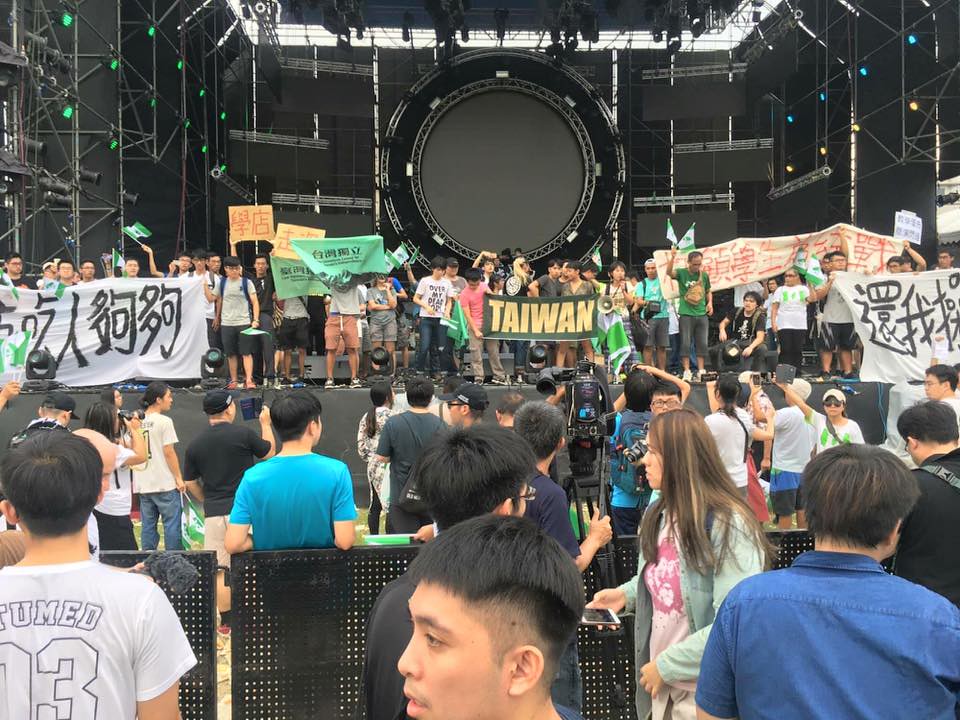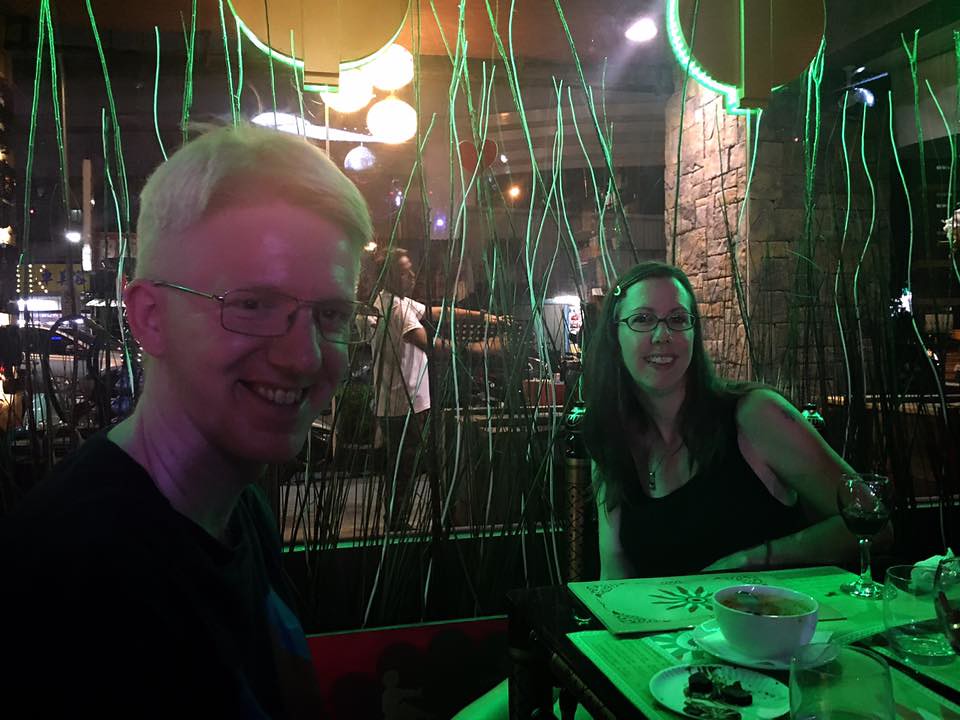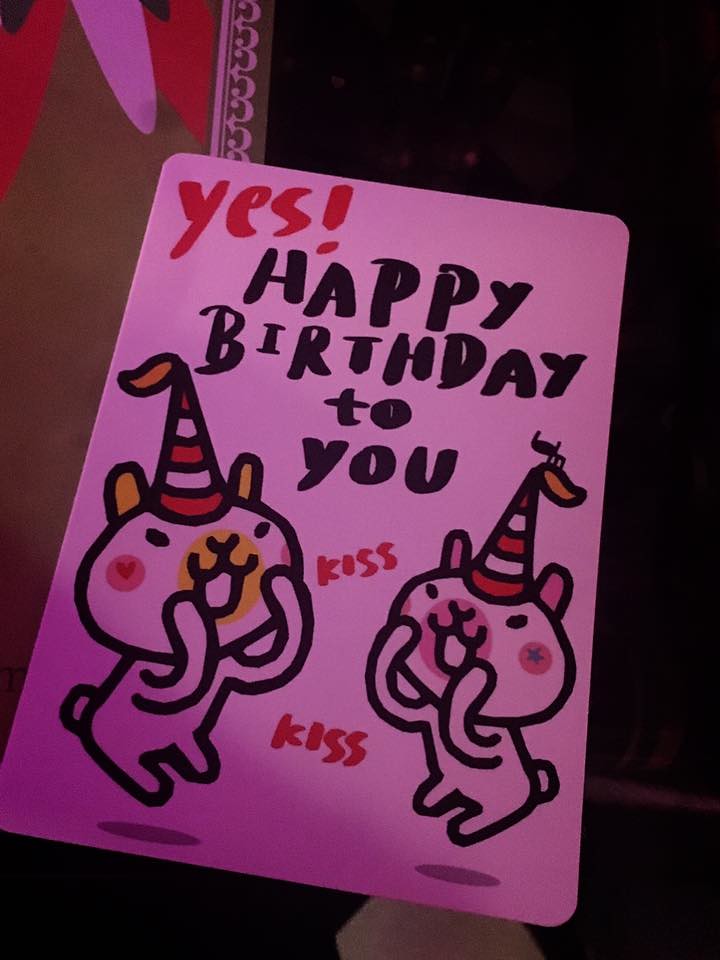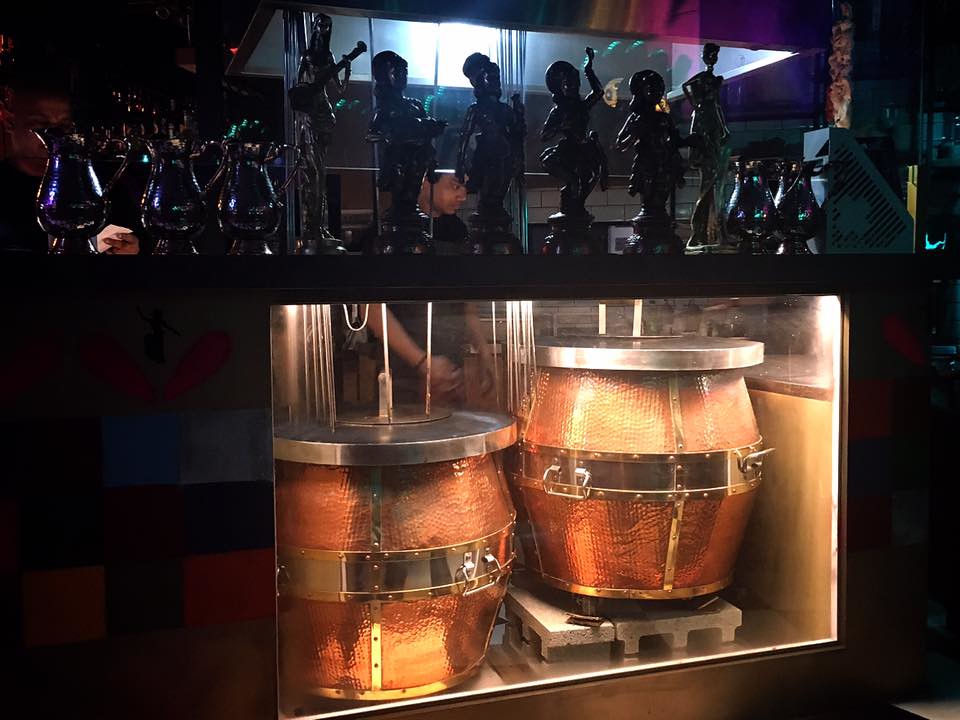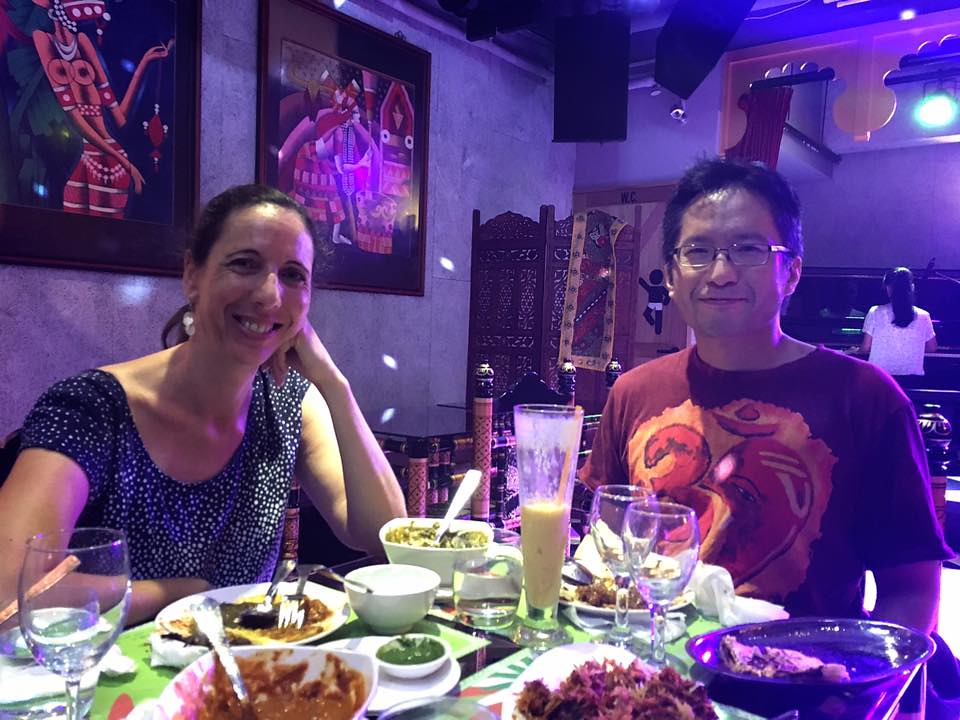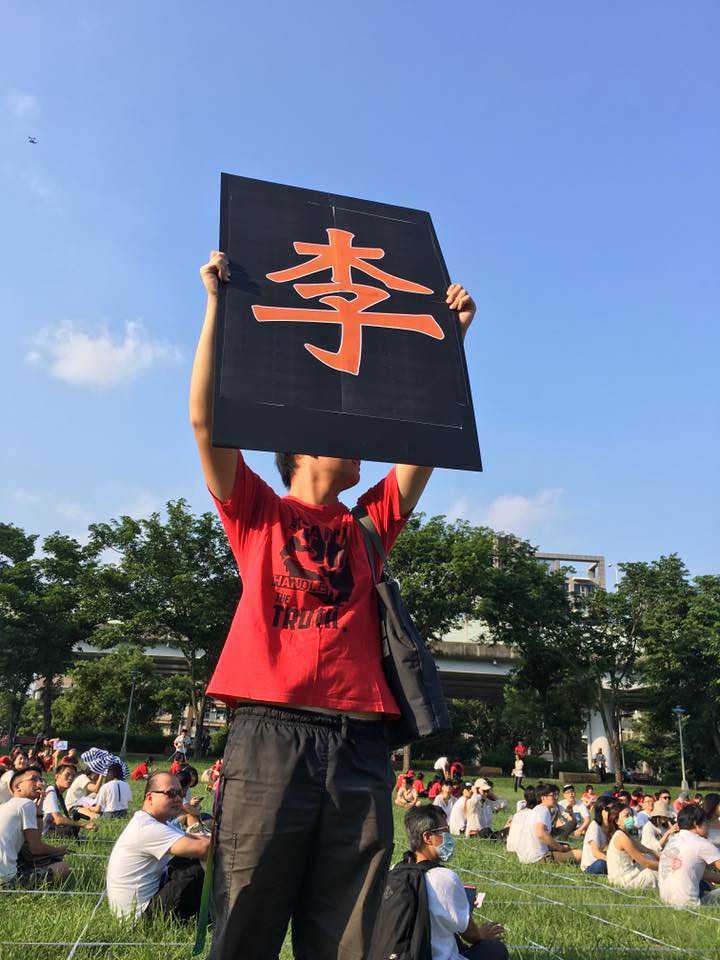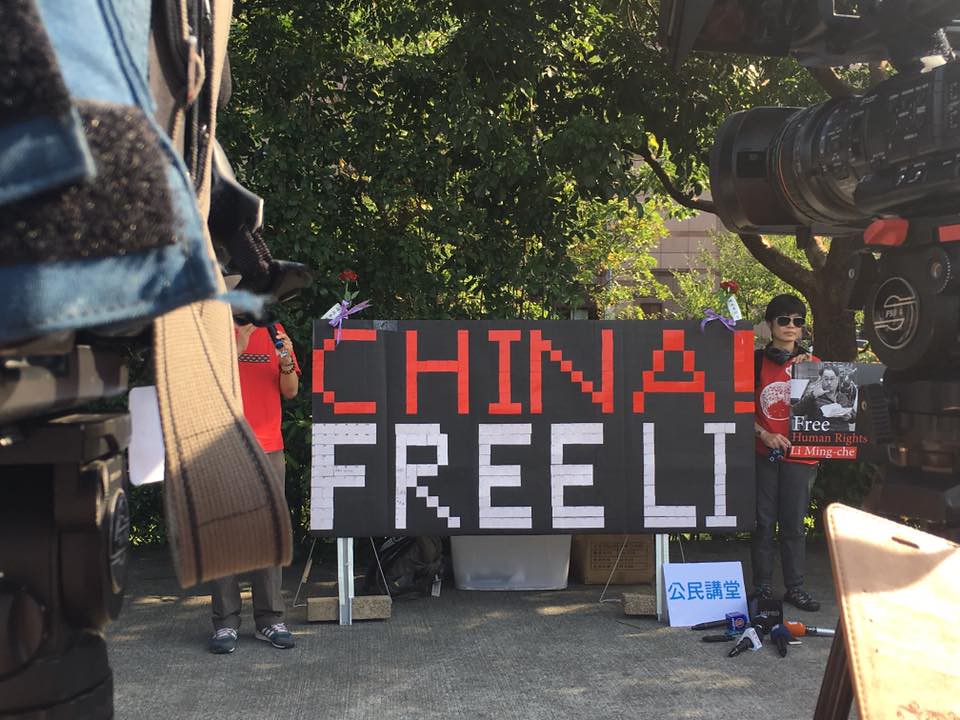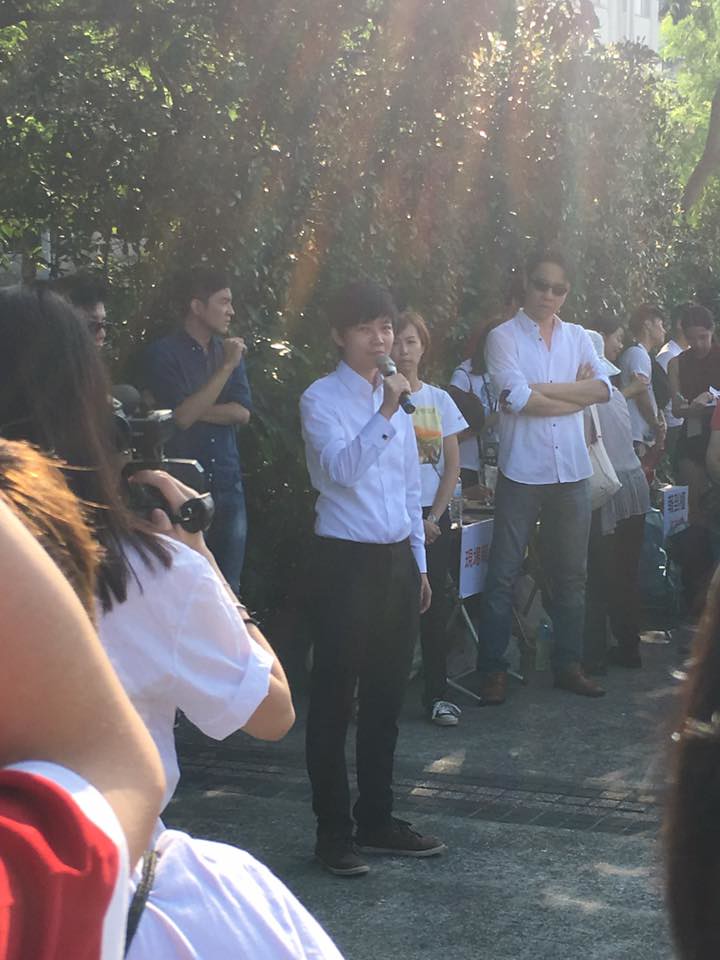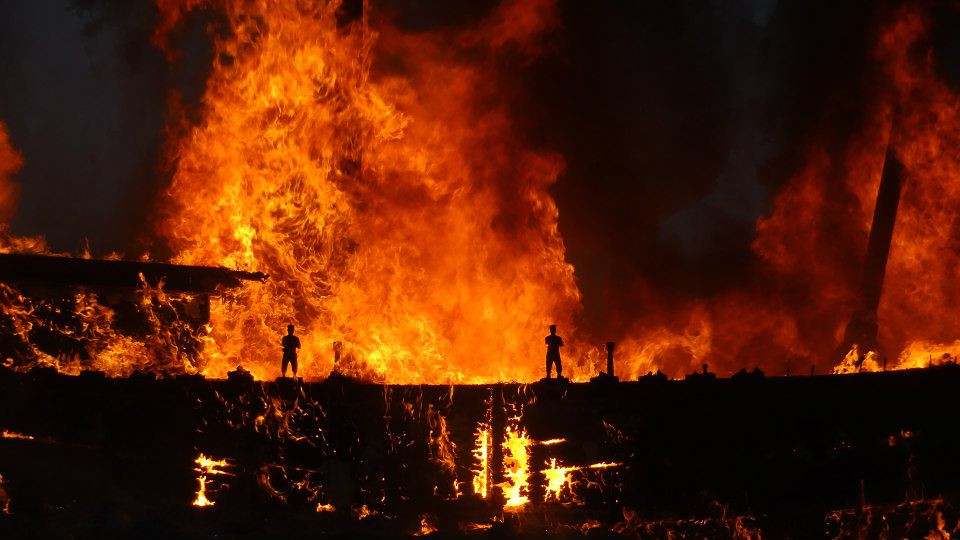 |
| Visual Footage of the Tsai-Trump Phone Call |
I woke up and it was the Apocalypse.
Children were wrenched from their parents' arms by bleeding reanimated corpses risen from the depths of Hell. Fiery stallions with coal-red eyes carried an army of Grim Reapers on their backs as the innocent shrieked for mercy. Rivers burned and oceans smoldered. Lifeless bodies hung from trees, their souls hanging inside out from their mouths. Wingèd gray-skinned Hellbeasts sliced through the air, the screams emanating from their long, knife-like beaks striking terror into every living creature as the black-clad sentries of Styx stood silent, unmoving, unscathed. The streets were littered with bones and splinters, some still attached to throbbing chunks of bloodied flesh and meat where they were pulled wholesale from human bodies. The sky was black and poisonous with clouds of sulphurous magma overhead as oilslick-black machines outfitted with insect-like exoskeletons impaled, strangled and violated women in front of their husbands and men in front of their wives with their cold mechanical tentacle appendages.
That is to say, American "President" Donald Trump and Taiwanese President Tsai Ying-wen had had a short, uneventful phone call, and the world subsequently burned as everyone tried to figure out what it all meant.
Apparently, it meant that Everything Was Over, that Donald Trump had irrevocably angered China, which would lead to world war, economic collapse and global catastrophe.
Of course, what it had meant was that the two presidents had had a phone call, acting like presidents of two sovereign countries, which they both are, rather than pretending the truth is somehow not true so as to avoid the breaking of a billion glass hearts. China got annoyed - almost certainly in part because the way the event was reported legitimized their anger - but things continued much as usual. Cargo ships plowed the ocean carrying the weight of global trade on their backs. US-China policy remained unchanged. Taiwan remained a pariah through no fault of its own, its status an accident of history, a free, industrialized democracy with almost no overt support. The rest of the world formulated a huge chunk of its Asia-Pacific policy to mollify China.
Some organizations did report on this honestly. John Bolton noted that it was time to revisit this policy (paywall - ugh), quite rightly pointing out that the current method of "acknowledging" China's position, selling some arms to Taiwan when we feel like it, doing lots of trade with Taiwan but otherwise telling it to bend over and take it whenever China gets angry, is unrealistic and unfair. The Daily Beast told everyone to just calm down everybody. The National Interest did a middling job, but has had some good recent pieces since. The Diplomat, which few people I know outside of Asia read, had a good piece by J. Michael Cole. Fox News' website ran an article whose viewpoint I agree with.
Generally, if you consider the editorial line of the sample above, the best reporting not only on this issue but on Taiwan in general has come from conservative sites, or at least those that are not explicitly liberal (The Daily Beast seems to be somewhere in the middle to me, The Diplomat neutral).
Contrast that to the media I, and my liberal friends, generally read. The Washington Post did put out an op-ed dubbing the phone call as "brilliant" (they had other coverage too, which I can't read because I don't subscribe). The New Yorker, however, called it "dangerous" (with a hefty helping of inaccurate "Taiwan and China split in 1949" history thrown in too), acknowledging that there is a case to be made for better Taiwan relations but then capitulating to the same old "China will see this as destabilizing" line. They threw in that "a subset of" conservative analysts felt the call was the right move, a line which, if anything, will turn off liberal readers. The New York Times said he'd hit China's "most sensitive spot", brought up issues of conflicts of interest, and noted that he "antagonized" China. Slate had its usual awful coverage of Taiwan, where it reiterated Beijing talking points with little context and openly calling it "a bad move". The Guardian did cover both sides, but made the anti-Taiwan side sound far scarier - "destabilizing", "didn't understand", "winging it". That's just a sampling - you can read more about this problem here. And here.
Imagine that you are a typical Western liberal. You skim one or two news sites - in my case, usually The Guardian, but others as well. If something major is happening relating to Taiwan you click, and you are exposed to a litany of phrases like these:
"destabilizing"
"antagonizing China"
"China and Taiwan split in 1949..."
"has angered China"
"amid tensions with China"
"dangerous"
"The Epoch Times / The Global Times / Xinhua said..." (with no similar quotes from the other side)
"President Xi has said..." (with no corresponding quotes from President Tsai)
"The two sides both claim to be the legitimate government of China" (technically correct but problematic)
"tensions mounted/rose/were caused"
"warmer relations under Ma Ying-jiu"
"relations have cooled since Tsai took office"
"Beijing regards Taiwan as a renegade province"
"not understand...the implications"
"island" (not country)
"eventually reunited with the Mainland"
This is not limited to the Tsai-Trump call - that's merely one example to illustrate a larger point. It's not only no surprise that some people I know - and many Western liberals generally - with no other connection to Taiwan often take the schizophrenic position that China is both not as scary as Taiwan thinks, as well as being scary enough that we must pursue peace in our time at all costs. A return to normalcy, if you will.
More broadly, there is widespread belief that if Taiwan makes any moves at all towards asserting the truth of its status - that is, a sovereign nation - the problem must always be Taiwan. For antagonizing China or destabilizing the situation which is why relations are frozen.
Why would they think otherwise, though? This is what they read from sources they trust, and therefore this is what they believe.
That is to say, Western education on Taiwan or lack thereof, which I wrote about recently, is not the only problem. Into that void of accurate background knowledge swoops a media all too willing to play up China and dismiss Taiwan, largely unquestioned in part because of that dearth of education on Taiwan. Both of these factors work together to keep the wheels of liberal apathy on Taiwan grinding away.
What I'm trying to say - now in bold! - is that it seems obvious to us that Taiwan is a liberal cause. Democracy, human rights, sovereignty, self-determination, marriage equality, successful industrialization, gains in women's rights, all poised to be destroyed by a hostile, illiberal, undemocratic foreign power. A pro-Taiwan perspective ought to be catnip for Western liberals.
However, when education on Taiwan is virtually non-existent, and everything above is what Western liberals are reading and generally believing, it is no surprise that we haven't won them over. If we want to win this fight, we have to flip the media script. Right now, we're losing.
There are so many ways, in fact, that Western, liberal-approved media has failed Taiwan that I'd like to explore as much as I can before we all get bored and go home.
The media mostly presents Taiwan in an unflattering political light
Sometimes, everything is the End of Days. Everything will anger China, everything will set off World War III in the Taiwan Strait. One must ask, by the way, if that is how dire some perceive the cross-Strait situation to be, how is it that they can then turn around and pontificate on how this is the best situation for Taiwan, because it's the only way to ensure peace?
Even when Armageddon is not nigh, there is a clear tendency to be quick to accuse Taiwan of being a "troublemaker", or to imply that this is the case. Any tensions that are raised are the fault of Taiwan for doing exactly what every other sovereign nation does: trying to sign trade agreements, insisting on its continued freedom, asking that it be allowed to participate - and its own name be used - in international events.
Those "tensions" which are not allegedly raised by Troublemaker Taiwan appear out of thin air, discussed in the passive voice, with no agent. They just are.
Of course, tensions don't appear out of nowhere: the times when they are not assigned to an actor are precisely the times when China is rattling its saber. When China makes destabilizing moves in the region, they are never to blame.
The true threats are ignored
The thing is, there are serious, extant threats to Taiwan's existence and sovereignty. Thousands of missiles are pointed at us. The United Front is highly active, and the CCP is waging a war of disinformation (that is, "fake news", a concept Western liberals are all too familiar with) on Taiwan, and is quite open about its economic and cultural cooperation initiatives being about the greater goal of political unification. They support "fake civil society" in Taiwan. China routinely ignores previous agreements and treaties in both Taiwan and Hong Kong, engages in military exercises aimed specifically at threatening Taiwan, detains foreign nationals both within and outside its borders for crimes not committed in China, supports gangsters using violence against demonstrators with whom they disagree, and has never renounced the possibility of using force to annex Taiwan.
These threats are real, and they are terrifying.
And yet, every time there are "tensions" in the Taiwan Strait, the issue is always something Taiwan has done to anger China. None of the real threats above get much airtime, if they get any. As for the real threats, how can one, for example, point to something as United Front work if one doesn't know the United Front exists, because nobody is reporting on it? How can one criticize the war of disinformation, fake civil society or even the missiles if they don't read about them in their favored publications?
No wonder readers think that China treats Taiwan relatively benignly, and therefore when Taiwan "antagonizes" China or does something "destabilizing", or causes relations to be "frozen", the problem might well seem to be Taiwan.
China's perspective gets prime real estate
In many cases, you'd think the media were just regurgitating CCP talking points (and in some cases, I am pretty sure they are doing exactly that). In this case, China's viewpoint is reported but unexamined (calling the Global Times what it is - a state-run tabloid - is insufficient). Here, it is reported in a larger context but yet again unexamined.
If you were thinking critically, you would wonder why it is that everything the Taiwanese side says is picked apart - if it is reported at all - and yet Beijing gets free quotes without criticism. That is not journalism. It is not neutrality. That is regurgitation.
That nobody questions this is its own problem - why would they, though, when they lack the education on Taiwan to do so, and when the sources they read and other liberals they know are likely to be well-disposed to China, and when they haven't even necessarily come to understand the depths of China's propaganda machine?
The perspective of Taiwan is not included
The same courtesy is not given to Taiwan: the desires of or even known political data about Taiwan are routinely ignored.
It's as though the Taiwanese have no opinion - but of course they do. It's just not included. You might think, from reading the slapdash summaries of Taiwanese history, that the Taiwanese had no will for independence before the 21st century. But of course they did, as far back as the 19th. In one sincere but misleading and poorly-researched example, you might come to the conclusion that, as one friend put it, the Taiwanese had no opinion on anything before pop star Chou Tzu-yu was forced to apologize to China for the stupidest of reasons.
When Taiwan's perspective is included, the talking points covered generally reflect those of the KMT: that Taiwan is the Republic of China and should remain so, that Taiwanese are ultimately Chinese, and that there is "one China" with "different interpretations". When pro-independence sentiments are included, they are attributed solely to the DPP, and not to any portion of the population - as though it is an unpopular platform of a party that managed to win the presidency and legislature regardless.
With many Taiwanese considering Taiwan to already be independent, and even those who express support for the status quo ultimately favoring a solution that leads to independence - with pro-unification beliefs having only single-digit popularity - this is very misleading. The lay reader would be expected to think that the Taiwanese are far more divided on the independence issue than they actually are.
Only recently has this changed in a few places. Note here the language: "proudly democratic Taiwan has shown no interest in being governed by the Communist Party rulers in Beijing." An improvement to be sure, but the article itself, and so many like it, exist to report the views of China with very little space given to the Taiwanese rebuttal beyond this one sentence.
Information on Taiwan is inaccurate or misleading
I'll stick to one example here - the most common one.
The blurb about "Taiwan and China separating in 1949" is common, yet wrong. While the ROC fled to Taiwan in 1949, Taiwan could not have "split" from China in that time, as before 1945 it was a colony of Japan, and was not formally ceded by Japan until the early 1950s. You could make a case that the ROC controlled both Taiwan and China between 1945 and 1949, but even there it gets murky. Japan had not formally ceded Taiwan to the ROC, and in fact under international law the situation is still "unresolved". In terms of de facto control, they started losing it in China as they were consolidating it in Taiwan.
And, of course, the sentence itself is misleading.
Reading these articles, the typical engaged liberal who has no connection to Taiwan nor any need for a deep knowledge of Taiwanese history could not be blamed for thinking that the Japanese colonial era had never happened at all, and that Taiwan has always been Chinese in some way or another. I have met people who believe exactly this, and are surprised to learn otherwise.
This problem can be extended to include all manner of slipshod reporting, from the "1992 Consensus" (those who know what the term means often have no idea that it doesn't actually exist) to pro-Taiwan activists being labeled "anti-China".
In one memorable example, when questioned on word choice, one reporter allegedly said it was due to the "character limit" on his submissions. Of course, if you count the characters in "pro-Taiwan" and compare them to "anti-China", you'll find...
...well.
When you add that the incorrect assumptions readers often make about Taiwan - e.g. that it had previously been a part of China for some time - to the language employed refusing to recognize Taiwan as a country but rather an "island", using terms such as "reunify" and even "Mainland" (I do think "Mainland" is a term we need to consign to history), it's no wonder that the average reader of liberal-leaning news publications likely doesn't think that "reunification" is such a big deal, or is hesitant to confidently call it a sovereign nation, even though it is one. Doubling down with talk of "one country two systems" - until recently not a proposition whose viability was questioned in any depth, it was just taken as a potential solution - and the "consensus" on "One China", your average reader could easily be led to believe that there is no reason to believe Taiwan is not ultimately Chinese.
This problem can be extended to include all manner of slipshod reporting, from the "1992 Consensus" (those who know what the term means often have no idea that it doesn't actually exist) to pro-Taiwan activists being labeled "anti-China".
In one memorable example, when questioned on word choice, one reporter allegedly said it was due to the "character limit" on his submissions. Of course, if you count the characters in "pro-Taiwan" and compare them to "anti-China", you'll find...
...well.
When you add that the incorrect assumptions readers often make about Taiwan - e.g. that it had previously been a part of China for some time - to the language employed refusing to recognize Taiwan as a country but rather an "island", using terms such as "reunify" and even "Mainland" (I do think "Mainland" is a term we need to consign to history), it's no wonder that the average reader of liberal-leaning news publications likely doesn't think that "reunification" is such a big deal, or is hesitant to confidently call it a sovereign nation, even though it is one. Doubling down with talk of "one country two systems" - until recently not a proposition whose viability was questioned in any depth, it was just taken as a potential solution - and the "consensus" on "One China", your average reader could easily be led to believe that there is no reason to believe Taiwan is not ultimately Chinese.
Good writers on Taiwan aren't writing for the mainstream publications liberals read, and the best news on Taiwan is disseminated only in a small echo chamber
As a prolific writer on Taiwan affairs, I am partly to blame here.
I know Lao Ren Cha only reaches a small audience which mostly already knows Taiwan. Others have their blogs or publications, but let's be honest, as useful as Ketagalan Media, New Bloom, the Taipei Times, The News Lens International and Taiwan Sentinel (and more) can be, these are not what mainstream liberals are reading. They are great places to write about domestic affairs and local issues. Sometimes, however, I wonder if we - myself included - write in these places to make ourselves feel better, rather than to actually reach that audience in the West.
Yet this is where we are writing, as we watch the Party apparatchiks, Fifty Cent trolls, well-meaning people who don't know what they're talking about, non-specialists who don't actually know Taiwan and various aspects of the United Front churn out piece after piece of drivel which is often accepted for publication.
Even when we branch out to The Diplomat, The Nation and The National Interest, again, this is not where the mainstream is.
How are we going to get our message out if we're not writing in where the people we want to reach are reading?
That's on us and it's time we did something about it.
Journalists and editors don't know what they're talking about
The first is that the reporters are often not experts: it creates a feedback loop of non-experts fact-checking against other media in which reports are filed by other non-experts, edited by editors who are not experts either, so nobody catches the inaccuracies. Major media outlets employ fact-checkers, but they're not particularly useful when they, too, are not experts and therefore are willing to default to the norm. When inaccuracies are pointed out, if anyone cares to make changes, a truly accurate picture of Taiwanese issues still seems to elude the media: they present China as more sympathetic than its aggression merits out of a desire to be "even-handed", not realizing that purported objectivity means nothing if it leads to incorrect narratives.
Then the readers read it, and believe it because the media source itself is reputable, without considering that maybe a part of why they are willing to believe what they read has a lot to do with the Gell-Mann Effect. To them, the journalist writing knows more - perhaps not considering that the journalist in question is still not an ideal source.
Then the readers read it, and believe it because the media source itself is reputable, without considering that maybe a part of why they are willing to believe what they read has a lot to do with the Gell-Mann Effect. To them, the journalist writing knows more - perhaps not considering that the journalist in question is still not an ideal source.
There have been quite a few casualties of this approach: nobody in the media questioned "one country two systems" as a viable framework until recently because nobody else in the industry did, either. Claims that Taiwan-China cooperation was merely economic, or that it was unquestionably a good thing for both sides were taken at face value, because nobody else was reporting on China's very open statements about how every agreement they sign with Taiwan is meant to further an agenda of annexation. The term "reunification" is still not questioned.
Reporters who do know quite a bit about China are often assigned articles on Taiwan, as though their expertise covers both countries (it doesn't). These reporters tend to be stationed in China - if they fly in from Beijing or Shanghai at all, they are here briefly, and never fully capture what's going on.
This is easy for me to say, but the China experts the media often assumes can write about Taiwan choke on the words.
Reading these reports, someone without background knowledge would not realize that China is threatening Taiwan militarily, that it actively interferes in Taiwan's attempts to form relationships with other countries, or that it is quite open about its "economic cooperation" initiatives having the ultimate goal of annexation. They would see China as an ever-patient world power, indulging troublemaker Taiwan because it can afford to do so.
Journalists and editors are too kind to China
Many of the reporters I criticize above seem predisposed to China - they often choose to live there, and have their own reasons for being interested in the country. Some might be "Old China Hands". They perhaps portray it overly sympathetically for the same reasons why we are more forgiving of our friends' flaws than those of strangers, or perhaps defensively, not wanting to criticize a place they care about. It's a human trait. Then they defend their kind-to-a-dictatorship portrayals as "evenhanded", because they're not rushing to denounce the regime. This is seen as taking a multi-faceted view of a "complex" country.
China is indeed complex, and its issues multi-facted, but when it comes to Taiwan, the story is quite simple: Taiwan is a currently sovereign democracy and wishes to remain that way. China is a dictatorship that insists this not be allowed, yet the current government of China has never controlled Taiwan. Period.
As for editors, despite foreign media banned from publishing in China, many are afraid to anger Beijing for fear of their reporters losing their press credentials, being deported or even detained. And they, too, seem well-disposed to China. Perhaps to many of them, in their offices in the West, China is a "fascinating" foreign country, with an unfortunate government perhaps but ultimately reducible to panda bears, pagodas, temples and qipao dresses. I get it - we liberals love the idea of "respecting foreign cultures", and that is usually a noble and meaningful goal. However, when that idealism interferes with reporting on facts because it's discomfiting to publish pointed criticisms at a foreign culture, we have a problem.
It's difficult to criticize reputable media
Everything else here is fixable, although it will be difficult. I want to end, however, with the one thing I don't know how to fix: the way one comes across to liberals when one criticizes mainstream media, especially media that they personally trust.
In the aftermath of the American election, a huge chunk of our discourse in the West turned its head down and looked right into its own navel.
In the ensuing discussion of Fake News and what it means to trust reputable sources rather than, well, any old website that lacks credibility, proven fact-checking or clear sourcing, all of the liberal favorites I mentioned above came out on top among that particular cohort. It was cool again to trust the New York Times or the Washington Post. You could put your faith in The Guardian or even the BBC.
Of course, the right-wing shot back, calling these sites the "true" Fake News.
I would generally agree with all of this, and I, too, like reputable news sites that have built up credibility and employ known fact-checking and journalistic ethics. I read these sources as well.
However, one casualty of this narrative is that pointed criticism of these mainstream liberal favorites make one sound exactly like the "New York Times is FaKe nEwZ!"-screaming zombies we deplore. Of course I am not trying to say the whole paper is "fake news", just that their reporting on Taiwan is misleading, incomplete or inaccurate. But that's how it reads, especially when we point to a larger problem rather than a single article (and even pointing to a single article is hard, because every other problematic article agrees with it, meaning you can't win).
Even pointing out, to end this at the Tsai-Trump phone call where we began, that perhaps in this one particular case Trump's action was - gasp! - not so bad, perhaps even something that a Western leader should have done a long time ago, makes one sound like a Trump apologist, if not a Trump supporter or someone who thinks Trump can be trusted. Of course I'm not - we're not - but it feels as though the bar for being accepted as a Good Liberal is set at hating every single thing Trump does.
I do hate every single other thing he does, but I simply cannot let go of the fact that on Taiwan, when he picked up that phone, he was doing exactly what I had been wanting a Western leader to do for some time. Did I trust the person doing it to be him? No. Absolutely not, never, forevermore my answer is no. I cannot ignore, however, that no other Western leader would have done it, including the ones I would have trusted to take that phone call.
We can try to correct the media. We can try to get our own work out there. We can write in. We can rebut. We can try to make the media better, and we can try to improve education on Taiwan in the West with what little class time we have.
But this? I don't know how to fix this.


